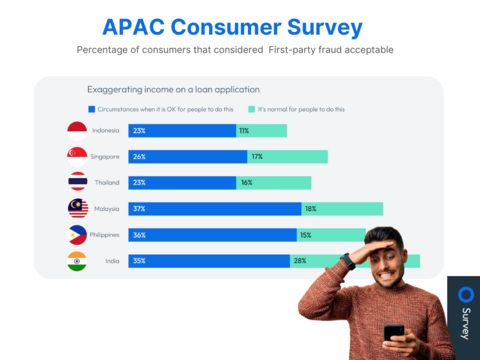Close to 1 in 4 Thais think it’s OK to deliberately mislead on personal loans, mortgages, auto and other applications.
FICO (NYSE: FICO):
This press release features multimedia. View the full release here: https://www.businesswire.com/news/home/20240923471658/en/

23% of Thais thought it was OK for people to exaggerate income on a loan application with a further 16% saying it was normal for people to do this. (Graphic: FICO)
Highlights
- Two in five Thais (39%) think it’s OK or normal for people to exaggerate their income on loan applications
- One in seven Thais (14%) believe it’s normal for people to deliberately misrepresent their income on mortgage applications
- Falsifying insurance claims is viewed as the most taboo form of fraud, with two in three Thais (68%) believing it is not acceptable
Global analytics software leader FICO today shared its latest global consumer fraud research, which revealed alarming attitudes toward first-party financial fraud both globally and in the Thai market.
The survey finds that while most Thai respondents view the misrepresentation of information while applying for financial products and making insurance claims unacceptable, a sizeable portion of the population feels otherwise.
Two in five Thais think it is normal or acceptable in some cases to misrepresent their income on an application for a bank account (39%), mortgage (39%) or automotive financing (39%). Additionally, two in five (39%) view the exaggeration of income on a personal loan application as normal or acceptable.
These sentiments closely align with global attitudes. The survey reveals that the majority of consumers (56%) firmly reject the idea of exaggerating income on loan applications, viewing it as never acceptable. One in four (24%) consider it permissible in certain circumstances, and one in seven (15%) view it as a normal practice.
“Consumers must understand that misrepresentation of information when applying for financial products can lead to serious consequences, even if done unintentionally,” said Aashish Sharma, APAC segment leader for risk lifecycle and decision management at FICO. “Banks can tackle the real problem of ‘liar loans’ by improving their ability to detect inaccuracies, enabling safeguards from bad debt while effectively preventing customers from committing fraud.”
More information: https://www.fico.com/en/latest-thinking/ebook/consumer-survey-2023-digital-banking-customer-preferences-and-fraud-controls
Acceptance of Application Fraud Rings Alarm Bells for Lenders
The FICO survey reveals that a quarter of Thai consumers (25%) believe it is acceptable under certain circumstances to lie on mortgage applications, and close to one in five (14%) view it as normal. This comes amid a steady rise in mortgage loan defaults in Thailand, as reported by the National Credit Bureau, highlighting the growing risk assessment challenges faced by Thai financial institutions.
Even when a mortgage application from an existing customer appears legitimate on paper, the established banking relationship can be exploited to commit fraud. By exaggerating income, such as inflating self-employment earnings or overstating bonuses, as well as omitting debts or misrepresenting personal circumstances, applicants can manipulate the loan process. This makes it difficult for lenders to detect these discrepancies without thorough and proactive verification measures.
“Combatting application fraud requires banks to elevate their risk assessment strategies,” noted Sharma. “This should include integrating comprehensive data analysis, employing anomaly detection analytics, and enhancing their ability to detect early signs of sleeper fraud or impending bust outs.”
Falsifying Insurance Claims Is Most Taboo
According to FICO’s research, falsifying insurance claims is viewed as the most taboo form of fraud, with around two-thirds of consumers globally believing it is never acceptable to exaggerate the value of stolen property or add false items to a claim. This sentiment is echoed by two in three Thai consumers (68%).
Matching global trends, attitudes shift regarding other financial products. Half of consumers globally, including more than half of Thais, feel it is unacceptable to exaggerate income on a mobile phone contract (55%) or an application for automotive financing (57%).
“The FICO survey reveals that many are adapting their views on application fraud based on circumstances,” noted Sharma. “Financial institutions must continuously adapt their fraud prevention strategies to keep up with these evolving trends, ensuring that customers are not inadvertently led into unethical or illegal activities.”
The survey was conducted in November 2023 by an independent research company adhering to research industry standards. 1,002 Thai adults were surveyed, along with approximately 12,000 other consumers in Canada, U.S., Brazil, Colombia, Mexico, The Philippines, Indonesia, Malaysia, Singapore, India, U.K. and Spain.

View source version on businesswire.com: https://www.businesswire.com/news/home/20240923471658/en/